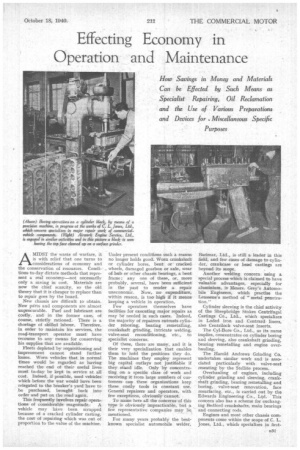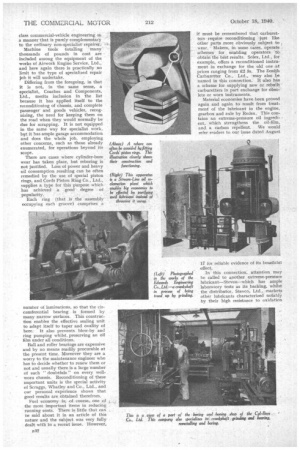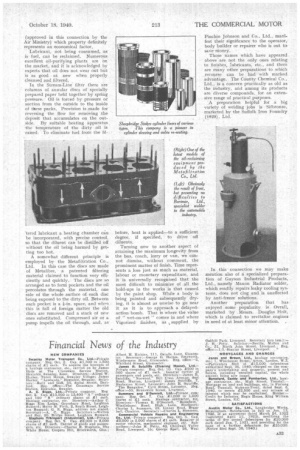Effecting Economy in Operation and Maintenance
Page 65

Page 66

Page 67

If you've noticed an error in this article please click here to report it so we can fix it.
How Savings in Money and Materials Can be Effected by Such Means as Specialist Repairing, Oil Reclamation and the Use of Various Preparations and Devices for * Miscellaneous Specific Purposes
A. MIDST the waste of warfare, it is with relief that one turns to considerations of economy and the conservation of resources. Conditions to-day dictate methods that represent a real economy—not necessarily only a saving in cost. Materials are now the chief scarcity, so the old theory that it is cheaper to replace than to repair goes by the board.
New chassis are difficult to obtain. New parts and components are almost unprocurable. Fuel and lubricant are costly, and in the former case, of course, strictly rationed. There is a shortage of skilled labour. Therefore, in order to maintain his services, the road-transport operator must have recourse to any means for conserving his supplies that are available.
Fleets depleted by requisitioning and impressment cannot stand further losses. Worn vehicles that in normal times would be regarded as having reached the end of their useful lives must to-day be kept in service at all cost. Indeed, if possible, used vehicles which before the war would have been relegated to the breaker's yard have to be purchased, brought hack into order and put on the road again.
This frequently involves repair opeia tions of considerable magnitude. A vehicle may have been scrapped because of a cracked cylinder casting, the cost of repairing which was out of proportion to the value of the machine. Under present conditions such a reason no longer holds good. Worn crankshaft or cylinder bores, bent or cracked wheels, damaged gearbox or axle, wear of hub or other chassis bearings, a bent frame; any one of these, or, more probably, several, have been sufficient in the past to render a repair uneconomic. Now, no expenditure, within reason, is too high if it means keeping a vehicle in operation.
Few operators themselves have facilities for executing major repairs as may be needed in such cases. Indeed, the majority of repairers entrusts cylinder reboring, bearing remetalling, crankshaft grinding, intricate welding, valve-seat reconditioning, etc., to specialist concerns.
Of these, there are many, and it is their very specialization that enables them to hold the positions they do. The machines they employ represent big capital outlays not justifiable if they stand idle. Only by concentrating on a specific class of work and receiving it from large numbers of customers can these organizations keep these costly tools in constant use. General repairers and operators, with few exceptions, obviously cannot.
To name here all the concerns of this type is obviously impracticable, but a few representative companies may be mentioned.
For many years probably the bestknown specialist automobile welder, Barimar, Ltd., is still a leader in this field, and few cases of damage to cylinder, crankcase or head castings are beyond its scope.
Another welding concern using a special process which is claimed to have valuable advantages, especially for aluminium, is Messrs. Grey's Automobile Engineers, which practise the Lenssens's method of "metal penetration."
Cylinder sleeving is the chief activity of the Sheepbridge Stokes Centrifugal Castings Co., Ltd., which specializes in Lcided iron and Centrard liners, also Centrilock valve-seat inserts.
The Cyl-Bore Co., Ltd., as its name implies, concentrates on cylinder boring and sleeving, also crankshaft grinding, bearing remetalling and engine overhauling.
The Harold Andrews Grinding Co. undertakes similar work and is associated particularly with valve-seat reseating by the Stellite process.
Overhauling of engines, including cylinder grinding and sleeving, crankshaft grinding, bearing remetalling and boring, valve-seat renovation, face resurfacing, etc., is carried out by the Edwards Engineering Co., Ltd. This concern also has a scheme for exchanging Bedford crankshafts, main bearings and connecting rods.
Engines and most other chassis components come within the scope of C. L. Jones, Ltd., which specializes in first
class commercial-vehicle engineering an a manner that is purely complementary to the ordinary non-specialist repairer.
Machine tools totalling many thousands of pounds in cost are included among the equipment of the works of Airwork Engine Service, Ltd., and here again there is practically no limit to the type of specialized repair job it will undertake.
Differing from the foregoing, in that it is not, in the same sense, a specialist, Coaches and Components, Ltd., merits inclusion in the list because it has applied itself to the reconditioning of chassis, and complete passenger and goods vehicles, recognizing, the need for keeping them on the road when they would normally be due for scrapping. It is not equipped in the same way for specialist work, but it has ample garage accommodation and does the whole job, employing other concerns, such as those already enumerated, for operations beyond its scope.
There are cases where cylinder-bore wear has taken place, but reboring is not justified. Loss of power and heavy oil consumption resulting can be often remedied by the use of special piston rings, and Cords Piston Ring Co., Ltd., supplies a type for this purpose which has achieved a good degree of popularity.
Each ring (that is the -assembly' occupying each groove) comprises a number of laminations, so that the circumferential bearing is formed by many narrow surfaces. This construction enables the effective sealing unit to adapt itself to taper and ovality of bore. It also prevents blow-by and ring pumping whilst, preserving an oil film under all conditions.
Ball and roller bearings are expensive and by no means readily procurable at the present time. Moreover they are a worry to the maintenance engineer who has to decide whether to renew them or not and usually there is a large number of such " doubtfuls " on every wellworn chassis. Reconditioning of these important units is the special activity of Scraggs, Whatley and Co., Ltd., and our personal experience shows that good results are obtained therefrom.
Fuel economy is. of. course,. one .ot the most important items in reducing running costs. There is little that can be said about it in an article of this nature and the subject was very fully dealt with in a recent issue. However,
it must be remembered that carburetters require reconditioning just like other parts more obviously subject to wear. Makers, in some cases, operate schemes for enabling operators to obtain the best results. Solex, Ltd., for example, offers a reconditioned instrument in exchange for the old one at prices ranging from £2 5s. The Zenith Carburetter Co., Ltd., may also be named in this connection. It also has a scheme for supplying new or rebuilt carburetters in part exchange for obsolete or worn instruments.
Material economies have been proved again and again to result from treatment of the lubricant in the engine, gearbox and axle by Redex. This contains an extreme-pressure oil ingredient, which strengthens the oil-film, and a carbon repellent. We would refer readers to our issue dated August 17 for reliable evidence of its beneficial effect.
In this connection, attention may he called to another extreme-pressure lubricant—Stevco--which has ample laboratory tests as its backing, whilst the distributor, Stevco, Ltd., markets other lubricants characterized notably by their high resistance to oxidation (approved in this connection by the Air Ministry) which property definitely represents an 'economical factor.
Lubricant, not being consumed, as' is fuel, can be reclaimed, Numerous excellent oil-purifying plants are On the market, and it is acknowledged by experts that oil does not wear out but is as good a'S new when properly cleansed and filtered.
In the Stream-Line filter there are columns of annular discs of specially prepared paper held together by spring -pressure. Oil is forced by pressure or suction from the outside to the inside of these packs. Provision is made for reversing the flow for removing the deposit that accumulates on the outside. By suitable heating apparatus the temperature of the dirty oil is raised. To eliminate fuel from the fil 'tered lubricant a heating chamber cin be incorporated, with precise control, so that the diluent can be distilled off without the oil being harmed by getting too hot.
A. somewhat different principle is employed by the Metafiltration Co., Ltd. In this case the discs are made of Metafibre, a patented filtering material claimed to function very efficiently and quickly. The discs are so arranged as to fomi pockets and the oil percolates through the material, one side of the whole surface of each disc being exposed to the dirty oil. Between each pocket is a i-in. space, and when this is full of foreign matter the old discs are removed and a stack of new ones substituted. Compressed air or a pump impells the oil through, and, as before, heat is applied—to a sufficient degree, if specified, to drive off diluents.
Turning now to another aspect of attaining the maximum longevity from the bus, coach, lorry or van, we cannot dismiss, without comment, the prominent matter of finish. Time represents a loss just as much as material, labour or monetary expenditure, and it is universally recognized that the most difficult to minimize of all the hold-ups in the works is that caused by the paint shop. While a body is being painted and subsequently drying, it is almost as unwise to go near it as it is to approach a delayedaction bomb. That is where the value of " wet-on-wet " comes in and where Vigorized finishes, as supplied by Pinchin Johnson and Co., Ltd., manifest their significance to the operator, body builder or repairer who is out to saVe.Money, Those names which have appeared above 'are not the only ones relating to finishes, lubricants, etc., and there are many other preparations to which recourse can be had with marked advantage. The County Chemical Co., Ltd., is a concern practically as old as the industry, and among its products are diverse compounds, for an extensive range of practical purposes.
A preparation helpful for a big variety of welding jobs is Sifbronze, marketed by the Suffolk Iron Foundry (1920), Ltd.
In this connection we may snake mention also of a specialized preparation of Guyson Industrial Products, Ltd.., namely Maxon Radiator solder, which readily repairs leaky cooling systems, does not clog and is unaffected by anti-freeze solutions.
Another preparation that has enjoyed some popularity is Ovrall, marketed -by Messrs. Douglas Holt, which is claimed to revitalize engines in need of at least minor attention. .




































































































